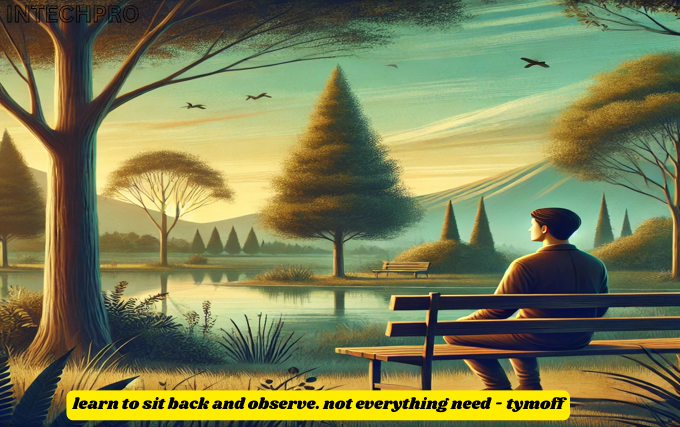In today’s fast-paced world, it’s easy to get caught up in the constant whirlwind of activities, decisions, and reactions. We often feel compelled to respond immediately to every situation, be it a social media post, a text message, or an event at work. However, there is immense value in learning to sit back and observe. Embracing this practice can lead to better decision-making, improved relationships, and a deeper understanding of oneself and the world. This article explores the importance of observation, its benefits, and how you can cultivate this skill in your daily life.
The Power of Observation
Enhances Understanding
Observation allows us to gather information and gain insights without the bias of immediate judgment or reaction. By taking the time to watch and listen, we can understand the nuances of a situation, identify patterns, and discern underlying motives. This deeper understanding can lead to more informed and effective responses.
Reduces Stress
Constantly feeling the need to react can be exhausting and stressful. By adopting a more observational approach, you can reduce the pressure to respond instantly. This creates a mental space for reflection and calm, helping to lower stress levels and improve overall well-being.
Improves Decision-Making
Decisions made in haste often lack depth and consideration. Observing before acting gives you the time to weigh the pros and cons, consider different perspectives, and anticipate potential outcomes. This thoughtful approach leads to better and more strategic decisions.
Enhances Relationships
In interpersonal interactions, observation can be a powerful tool for improving relationships. By listening more and speaking less, you can understand others better, empathize with their feelings, and respond more appropriately. This can lead to more meaningful and effective communication.
Cultivating the Skill of Observation
Practice Mindfulness
Mindfulness is the practice of being fully present in the moment. By focusing on the present, you can observe your surroundings, your thoughts, and your emotions without judgment. Mindfulness techniques, such as meditation and deep breathing exercises, can help you develop this skill.
Slow Down
In our busy lives, slowing down can seem counterintuitive, but it’s essential for effective observation. Take time to pause, breathe, and pay attention to your environment. Whether it’s a walk in the park or a quiet moment at your desk, slowing down allows you to notice details you might otherwise miss.
Listen Actively
Active listening involves fully concentrating on what is being said rather than passively hearing the message. It requires focusing on the speaker, understanding their message, responding thoughtfully, and remembering what was said. This practice can significantly enhance your observational skills in conversations.
Limit Distractions
Distractions can hinder your ability to observe and process information effectively. Minimize distractions by creating a conducive environment for observation. This might involve turning off notifications on your devices, finding a quiet space, or setting specific times for observation without interruptions.
Reflect Regularly
Reflection is an essential component of observation. Take time to reflect on your observations, whether through journaling, discussing with others, or simply thinking about them. Reflection helps you connect the dots, see patterns, and gain deeper insights.
Applying Observation in Various Aspects of Life
In Personal Growth
Observation is crucial for personal growth. By observing your thoughts, behaviors, and emotions, you can identify areas for improvement, understand your strengths and weaknesses, and make conscious efforts to grow. This self-awareness is the foundation of personal development.
In Professional Settings
In the workplace, observation can enhance your effectiveness and productivity. Observing colleagues can help you understand team dynamics, identify opportunities for collaboration, and navigate office politics more effectively. It can also aid in problem-solving and innovation by allowing you to see issues and opportunities from different angles.
In Social Media
Social media often encourages immediate reactions and judgments. By adopting an observational approach, you can engage with content more thoughtfully. Before reacting to a post or comment, take a moment to understand the context, consider different perspectives, and decide whether a response is necessary or beneficial.
In Conflict Resolution
Observation plays a critical role in resolving conflicts. By observing the behavior, emotions, and underlying issues of the parties involved, you can facilitate more constructive and empathetic dialogues. This can lead to better resolutions and stronger relationships.
Overcoming Challenges in Learning to Observe
Dealing with Impatience
One of the biggest challenges in learning to observe is dealing with impatience. In a culture that values quick responses and immediate gratification, slowing down to observe can feel uncomfortable. Overcoming this requires conscious effort and practice. Start with small steps, such as pausing for a few seconds before responding to a message or taking a few deep breaths before making a decision.
Managing Anxiety
For some, observation can lead to anxiety as it involves facing situations without the immediate distraction of action. To manage this, focus on grounding techniques such as deep breathing, mindfulness, and positive affirmations. Remember that observation is not about inaction but about informed and thoughtful action.
Building Consistency
Like any skill, observation requires consistent practice. Set aside specific times each day for observation, whether it’s during your morning routine, at work, or before bed. Over time, this practice will become more natural and integrated into your daily life.
Conclusion
Learning to sit back and observe is a powerful skill that can transform various aspects of your life. It enhances understanding, reduces stress, improves decision-making, and strengthens relationships. By practicing mindfulness, slowing down, listening actively, limiting distractions, and reflecting regularly, you can cultivate this valuable skill. While it may come with challenges, the benefits far outweigh the efforts. Remember, not everything needs a reaction. Sometimes, the best course of action is to observe, understand, and then decide the best way forward.


